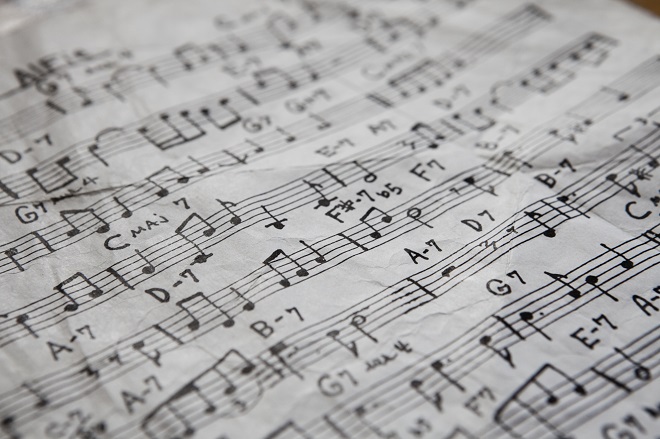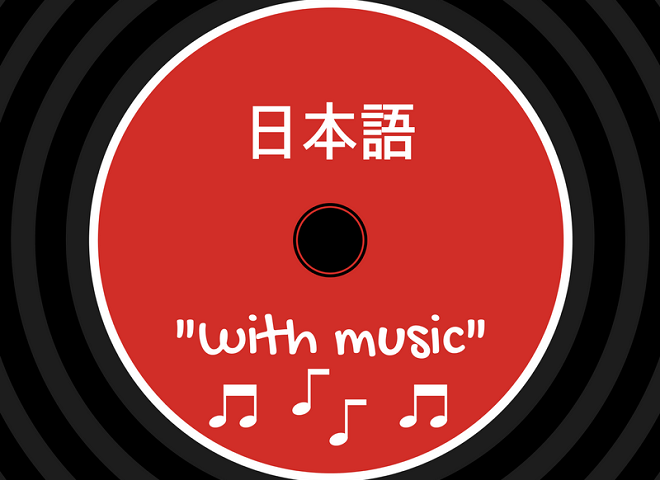Have you ever learned a song that you heard on the radio without even trying to do so? Many people listen to pop songs once or twice and are then able to sing most of it, without having put much effort into learning it in the first place.
Did you know that you can learn Japanese with music in much the same way?
It’s something that’s was proven to work decades ago, and yet it is something that is hardly ever used! I sure as heck didn’t use it in school when I was growing up!
But I did hears things like “listening to Mozart will make you smarter” which as it turns out, has some truth to it. Just like how the food you put into your body will alter it, the sounds you put into your brain can also have an effect.
But getting back to learning Japanese through music…
I guess the biggest questions are: why does this happen and how can you use it to your advantage? That’s exactly what we’ll explore in the post below.
By the way, if you’ve learned Japanese (or another language) with similar methods, I’d love to hear from you! Be sure to leave your thoughts on the topic with a comment at the end to share with me and others.
What is whole brain learning?

Your Neo-Cortex (your “thinking brain”) is divided into two halves. The left half deals primarily with logic, details, and language. The right half deals primarily with creativity, big picture things, and music.
What studies have found is that the normal way most people learn, lectures and reading, only engages the left half of the brain, leaving the right half dormant during the learning process.
But, studies have showed that when people listened to music while learning, both the left side AND the right side of their brains were engaged! This is what is known as whole brain learning.
This answers the earlier question of “why do you learn songs on the radio without even trying?” While listening to songs, your brain’s left half is focused on the words, while your brain’s right half is focused on the melody.
This means that 100% of your human brain is involved in the learning process, instead of just half of it – which is how most people learn new things, most of the time.
Study after study has shown that this process of “whole brain learning” is vastly superior to the normal method that most people are naturally taught to use while they spend their formative years in the school system.
But it’s not just any song can be used to help you learn Japanese. Certain kinds of music will actually hinder you when it comes to learning. Want to know how to tell the difference?
What type of music works?

When it comes to incorporating music into your study sessions, you must be very selective with the music you use. And here is the key: you need music with no words.
The melody of the song engages the right half of your brain, while the words of the song engage the left half of your brain. But you need the left half of your brain to focus on the Japanese words that you are learning, and not the words of the song.
Therefore, using music with no words allows you to engage your whole brain while focusing on learning the Japanese language.
The very best music to use is soft, classical music. This is primarily for two reasons:
- It puts you into a relaxed state, which also happens to help with learning.
- The “melody only” aspect engages the right half, and the Japanese words engage the left half (what we’ve been talking about so far).
Another reason that using music works is because it engages your emotions. Anything that you do or learn while in a heightened emotional state goes easily into your long-term memory.
Isn’t it true that certain songs get you pumped and excited? And other songs make you feel nostalgic, and sometimes even sad?
It’s been said that music touches the soul, and from my own experience of it, I would have to agree.
That’s the thing though: anything that can deepen your experience while learning will, of course, deepen the learning of the thing itself.
P.S. I’ve also read that if you listen to relaxing music in the background, it helps to keep your mind from becoming tired. That means it’s easier to stay focused longer!
How can you use it?
Here are some of the different ways that you can use music in order to improve the speed at which you learn Japanese:
First of all, you can play soft, classical music in the background while you read, speak, and work on your Japanese. Personally, what I like to do is to play music from my favorite video games (JRPGs have lots of classical type music) while I do a daily lesson of Rocket Japanese or while I’m reading any Japanese books.
This series above on YouTube is by far my favorite to utilize!
Remember when I said that you need to use music with no words? Well, there is one exception to this rule. If it’s a song in Japanese, and you are trying to learn those exact Japanese words, then it’s okay.
But I would advise you only listen to that song and not work through some Japanese vocabulary. One thing at a time.
I believe that it is a survival mechanism, but your brain is set up and trained to focus in on voices. That’s why it’s so easy to get distracted when other people are talking – your brain is overriding your focus to eavesdrop (silly brain!).
Anyway, getting back to learning Japanese through Japanese songs with lyrics:
You can learn by listening to Japanese songs, and SINGING ALONG with them in Japanese and this works pretty well for several reasons:
(1) The first reason is because music uses rhythm and rhyme. Your brain is setup in such a way that it’s always looking for patterns and structure. Both of which are essential parts of any song (and speaking too).
(2) The second reason is because songs have meaning. An individual word by itself doesn’t mean much to the human brain. There’s usually not enough association with just a single word. But when words are combined into a sentence, it creates a mental image or a feeling that is much easier to remember. And like we’ve talked about before, music is PACKED with feelings!
(3) And finally, when you sing along with the song in Japanese you are involved. Two of the ways that you can move information from your short-term memory into your long-term memory are to repeat it, or use it. Both of which happen when you sing!
Bottom line: the more you can actively engage with the language, the faster you will learn it.
What works best for you?
The most important thing is to find something that works for you, and then to do it each and every day. Like I said earlier, I personally use music in the background, but maybe you would rather sing along to Japanese songs. My favorite Japanese band is none other than BABYMETAL! You should check them out, because they are awesome!
Now it’s your turn! Have you ever used music to help learn something? Who’s your favorite Japanese band? Let me know with a comment below!
Further Resources for Learning Japanese:
#3 Get My eBook (Secrets to Learning Japanese) for Free

またね!

Great information! I never thought about using this method, although I wish I had known about it back in high school!
I knew that learning music from the radio was easy and it never occurred to me it’s because both parts of the brain are being used…so interesting!
Yeah, it’s not something that is typically taught or used, but I think that a lot of people discover it on their own naturally. Why else would there be so many “music for studying” CDs and YouTube videos out there, right?
Maybe most people just aren’t aware of how it can be harnessed to improve their results. That is the kind of information that I want to share with as many people as possible, especially those who are learning Japanese! 😉
Interestingly enough I have tried this before with Spanish and it’s definitely a strong method to learn a language!
While I’m by no means fluent I have found that my conversational spanish has drastically improved from listening to the radio and even TV (I’m normally buried face first into the laptop and have it running in the background whilst I’m working so subconciously I’m learning)
It’s interesting to read alittle of the science behind it, quite intreguing to be sure!
Yeah, having something on in the background like TV or music in another language is a great way to get your ears used to it. I’ve got a Chinese friend who told me the primary way she learned English was by listening to English radio stations. Pretty cool!
This is such an interesting article! Long time ago when I was learning German, I really enjoyed listening to German rock ballades and it really thought me a lot without me even noticing it. I never really understood why, but now I do! Thank you for opening my eyes. It’s not really classical music, but soft never the less!
Thanks! I’m glad you liked it. Yeah it’s really interesting how easy it is to learn words that are accompanied with music.
Hi Nick,
When I was trying to study for JLPT 4 (Japanese Language Learning Test), I knew I would fail the listening part. My reading and writing were not bad, and I was confident I could pass those two. But I just got suck in speaking and listening. Music became my ally. I would try to listen to and sing Japanese songs and they helped me tremendously to pass the test. 🙂
That’s awesome! Yeah, it is definitely hard to learn all the different aspects of Japanese – reading, writing, speaking, and listening – but using music and singing along helps a lot with speaking and listening parts!